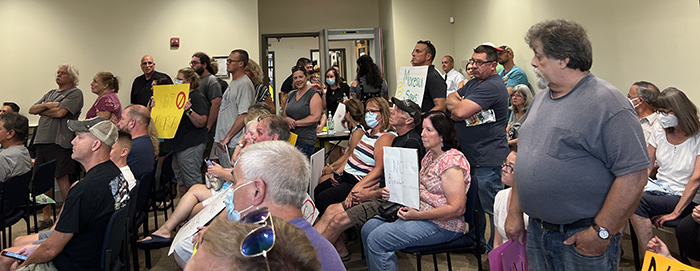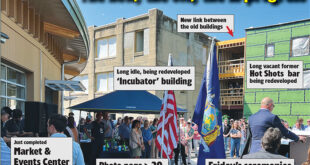By Zander Frost, Chronicle Staff Writer
The Moreau Planning Board approved the Saratoga Biochar facility, with stipulations, by a 4-2 vote Thursday night.
John Arnold, Erik Bergman, Meredithe Mathias and Adam Seybolt voted in favor.
Ann Purdue, Esq. and Michael Shaver voted against.
Hundreds of project opponents lined the entryway to the town hall prior to the meeting, carrying “no Biochar” signs.
Security was present. Meeting attendees had to pass through a metal detector and sign in. A Sheriff’s deputy stood in sight behind the Planning Board.
The room was so full some people were stuck on the other side of the metal detector, leaning in to watch.
It triggered very loud, repeated beeps from the detector. Eventually the security officer shrugged and turned it off.
The meeting lasted nearly four hours. By the end, much of the crowd had left.

The meeting opened with Ms. Purdue, vocal critic of Biochar, moving to rescind the SEQR [State Environmental Quality Review] approval of the project.
Ms. Mathias seconded the motion so discussion could be opened.
Acting Chairman Mr. Arnold went point by point through Ms. Purdue’s motion, and said he could not find new information that would cause the board to reconsider its SEQR approval.
Her resolution was voted down 5-1.
Ms. Purdue’s stance throughout was that an independent consultant was needed to evaluate the project.
Discussion moved to proposed approval with a list of contingencies that the board created prior to the meeting.
They read the list aloud and then approved, edited or removed each point.
Conditions included noise levels, pollution, and contingencies if the Department of Environmental Conservation modifies its list of toxic chemicals.
A point of contention was a clause requiring Saratoga Biochar to carry a $1-billion environmental liability policy, in addition to general liability insurance.
Ms. Purdue said that while she is not an insurance expert, she feels this policy is necessary because Biochar’s “operation is this facility here and nothing else. If there is liability…you need to have some kind of financial recourse or recovery.”
She cited the recent Hoosick Falls PFOA pollution judgment as example of a lack of recourse in environmental damage.
Mr. Arnold said Saratoga Biochar had already objected, saying the limit “is an arbitrary, capricious, commercially unavailable and is an impossible condition.” It added, “Perhaps this was a typo.”
A Saratoga Biochar representative later said their policy would be in the “$5-10 million range in liability, but the per occurrence would be $1-2 [million].”
Karla Buettner, Planning Board attorney, said she believed the board did not have the authority to put such requirements on an applicant.
Mr. Arnold said “failure to maintain insurance does not allow the planning board to shut down operations because we can’t do that. That’s not ours.”
The board voted to strike the insurance requirement 5-1.
Ultimately, Biochar’s site plan review was approved by a 4-2 vote.
The remaining Biochar opponents yelled out in frustration. Some said “this is not over” and said they’d bring the continued challenge to the DEC.
Biochar CEO Ray Apy told The Chronicle, “That was a long night. And it was a really tough, tough process for the planning board to get through. And I thought they managed it well.”
He said, “We’re happy that we have this decision, but it doesn’t come without a price. The conditions are tough…but so be it. That’s good, it’s the right thing to do.”
What does he think of the community reaction? Mr. Apy replied, “I wouldn’t categorize it as the community because there’s 17,000 residents in Moreau, and they’re not all here.”
Copyright © 2022 Lone Oak Publishing Co., Inc. All Rights Reserved
 Glens Falls Chronicle Serving the Glens Falls/Lake George region; Warren, Washington and northern Saratoga counties since 1980
Glens Falls Chronicle Serving the Glens Falls/Lake George region; Warren, Washington and northern Saratoga counties since 1980


